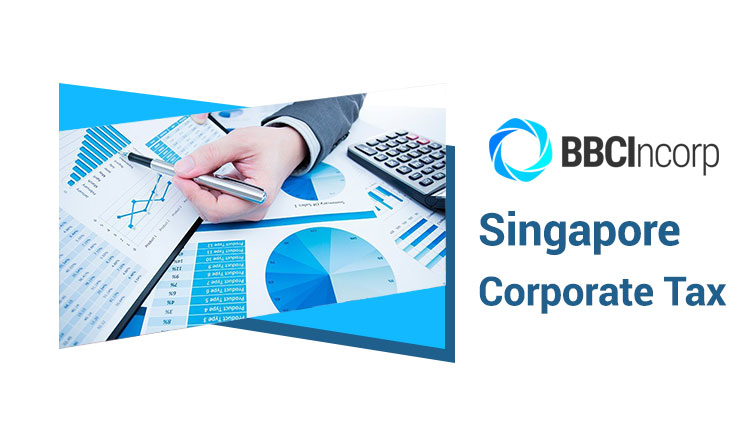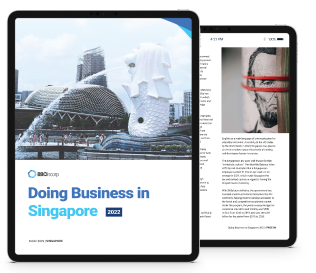
Singapore corporate tax is one of the most crucial factors that attract thousands of investors to the country. The Singapore corporate tax rate is quite low, currently standing at 17%.
However, the actual payable corporate tax in Singapore is much lower due to many available tax schemes. The tax rate can go down as low as 4.25%.
1. Overview of corporate income tax in Singapore
Singapore’s favorable tax system is one of the main reasons why many global entrepreneurs and enterprises invest their resources into the nation. The government takes a progressive and pro-growth approach to many of its policies.
Singapore adopted a territorial approach to tax companies on their earned income. This means a proportion of corporate income is only taxed in Singapore when it is generated in or derived from Singapore. Another circumstance where corporate income is taxed is when it is remitted to Singapore from another foreign source.
The corporate rate is continuously lowered over the years and, thus far, is fixed at a flat 17%. This rate alone helps the city-state to maintain its standing as one of the most favorable tax systems in the world.
Here are some other worth-noticing tax features in Singapore:
- Individual shareholders are not taxed for dividends paid by a Singapore resident company, thanks to the single-tier corporate tax system.
- Singapore eliminates capital gains tax.
- Singapore has ratified Double taxation treaties with up to 80 countries. Therefore, very rare is the chance your profits are taxed by both jurisdictions.
- Should you wish to embark on a venture specialized in R&D or technology and innovation, you can enjoy many perks and tax incentives.
Free ebook
Get your Singapore business started with key matters covered in our all-in-one guideline
- Incorporation procedure
- Annual compliance requirements
- Tax structures
- Employment landscape

1.1. Tax residence in Singapore
A tax resident company is one that is controlled and managed within Singapore.
Taking it broadly, the “control and management” of a company connotes its strategic activities and decision-making process.
So if your company convenes its board meeting mostly inside of Singapore, it is deemed a tax resident, regardless of whether its income-generating activities are performed remotely in some far-flung countries.
The other way around holds true too. So as long as the control and management of your company – i.e. its strategic matters are conducted in countries other than Singapore, it does not have to bear the tax residency status.
The tax liabilities of these 2 statuses seem like 2 peas in 1 pod. Nevertheless, a tax resident is entitled to many tax advantages, including:
- Start-up tax exemption scheme for newly-founded companies
- Income tax exemption on dividends and service income derived from foreign sources, and profits generated from foreign branches when certain conditions are met
- Tax reliefs as a result of up to 80 ratifications of many double-tax treaties
1.2. Taxable income in Singapore
For tax purpose, taxable income of a Singapore company refers to:
- Profits gained from carrying out any trade or businesss
- Investment income such as dividends, interest and rental
- Royalties, premiums and other profits from property
- Other gains that are revenue in nature.
Moreover, as aforementioned, a company is also taxed on foreign-sourced income when the income is received in Singapore. In particular, foreign-sourced income is divided into 3 groups:
- Foreign-sourced dividends
- Foreign branch profits
- Foreign-sourced service income
1.3. The falling trend of Singapore corporate tax rate
At the time this article is published, the headline rate of Singapore’s corporate income tax is flat at 17%. More than 20 years ago in 1997, it was much higher at a rate of 26%, being continuously cut down and now fixed at the current rate.
Nevertheless, this rate is not necessarily indicative of the effective rate. Singapore offered an array of tax exemption and tax schemes that you can exploit to lower down the effective rate.
And as we have mentioned at the outset, capital gains, dividends or even income that is derived from other countries but is not remitted to Singapore are all exempted from tax.
1.4. Year of Assessment for tax determination in Singapore
All the taxable income of a Singapore company generated in a “financial year” will be assessed and calculated in the following year. This following year is called “Year of Assessment” (YA).
To determine a financial year, the Inland Revenue Authority of Singapore (IRAS) will take into account the financial year end of a company. Most companies in Singapore choose its financial year end to fall on 31 December. However, a company can still change its financial year end for tax purpose. Below are examples of financial years and the Years of Assessment:
| The financial year end | The financial year | The Year of Assessment |
|---|---|---|
| 31 March | 1 April 2019 – 31 March 2020 | 2021 |
| 30 June | 1 July 2019 – 30 June 2020 | 2021 |
| 31 December | 1 January 2020 – 31 December 2020 | 2021 |
2. Tax Reduction for companies in Singapore
Resident companies can make use of the following schemes to legally reduce their payable tax in Singapore:
2.1. Tax exemption scheme for startups in Singapore
The start-up company scheme was introduced in 2005 with an aim to draw entrepreneurs and investors to Singapore. This scheme is targeted solely at resident companies in the embryonic stage. It backs up these qualifying businesses by offering them many partial and full tax exemptions.
Your company would be qualified for this start-up tax exemption scheme for the first 3 consecutive years as long as:
- It is incorporated in Singapore
- It is considered a Singapore tax resident
- It has no more than 20 shareholders, of which either all are individuals beneficially and directly holding the shares in their own names; or at least one individual is holding no less than 10% of the ordinary shares.
However, new start-up companies working in investment-holding or sales of and investment in property development are excluded as candidates for this tax exemption scheme.
Your newly-established company, when meeting the above-mentioned conditions, will receive a 75% tax exemption on the first S$100,000 of taxable income and another 50% tax exemption on the next S$100,000 of taxable income. It means that the effective tax rate on the first $100,000 is 4.25% and the rate on the next $100,000 is 8.50%.
| Taxable income (S$) | Effective corporate tax rates |
|---|---|
| 0 – 100,000 | 4.25% |
| 100,001 – 200,000 | 8.50% |
| Over 200,000 | 17% |
For example: Your company’s taxable income is $180.000, then with the tax exemption scheme for startups, you need to pay [100,000 x 4.25%] + [80,000 x 8.5%] = 11,050 SGD (compared to 30,600 SGD when applying the tax rate of 17%).
2.2. Partial tax exemption (PTE) scheme for Singapore companies
After the tax exemption scheme for startups expires, your company will be entitled to the Partial Tax exemption (PTE). In general, all companies can benefit from this scheme as long as they do not claim the tax scheme for start-ups.
Your company, when meeting all the criteria, would be entitled to the following exemptions:
- A 75% tax exemption on the first $10,000 of chargeable income
- Another 50% tax exemption on the next $190,000 of chargeable income
| Taxable income (S$) | Effective corporate tax rates |
|---|---|
| 0 – 10,000 | 4.25% |
| 10,001 – 200,000 | 8.50% |
| Over 200,000 | 17% |
For example: Your company’s taxable income is $180.000, then with the partial tax exemption scheme, you need to pay [10,000 x 4.25%] + [170,000 x 8.5%] = 14,875 SGD (compared to 30,600 SGD when applying the tax rate of 17%).
2.3. Tax rebate
Ever since 2013, on a yearly basis, the government has announced a tax rebate for Singapore companies. The rate is different every year and the rebate is subject to a cap. For 2020, the rebate rate was 25%.
For example: Your company’s taxable income is $180.000, by applying the partial tax exemption scheme, you need to pay 14,875 SGD (as calculated above). Then, with a tax rebate, the payable tax of your company is lowered to [14.875 – (14.875 x 25%)] = 11.157 SGD.
NOTE: Tax rebate is not extended in 2021.
2.4. Tax exemption for foreign-sourced income
According to the Inland Revenue Authority of Singapore, dividends and service income derived from foreign sources, and profits generated in foreign branches are entirely exempt from Singapore corporate tax.
Nevertheless, if you wish to remit your foreign-source income to Singapore tax-free, you should see to it that you can satisfy the following requirements:
- The foreign-sourced income has been taxed in the foreign country when it is remitted to Singapore
- The headline tax rate at the foreign source must be at least 15% when it is remitted to Singapore
- The government is convinced that the tax exemption would benefit the resident in Singapore
2.5. Tax treaties
Singapore posits that double taxation takes its toll on international trade. The reason is that it charges a taxpayer twice for the same product/service rendered. In order to address this, the city-state has entered into the Avoidance of Double Taxation Agreement with more than 80 countries and counting. These ramifications, coupled with the other tax credits, have aided in eradicating altogether this unfair tax policy.
Chances are you and your business partners in other jurisdictions can benefit from the reduced tax rates regulated in these tax treaties.
From YA2009 onwards, companies operating in countries that have not concluded DTA with Singapore can resort to unilateral tax credits.
3. Tax filing requirements for Singapore companies
It is pretty simple and straightforward to file Singapore corporate tax. Pursuant to IRAS, you would be required to prepare and submit estimated chargeable income (ECI) and corporate income tax return (Form C or Form C-S).
Estimated chargeable income (ECI) is simply the estimate of income that is subject to tax after tax-allowable expenses have been deducted. You are given a deadline of 3 months since the financial year-end of your company to file ECI. If your annual revenue is not higher than S$5 million and your ECI is Nil in the year of assessment, you are not obliged to file the ECI even if you have received notification from IRAS to do so.
Form C or Form C-S is the vehicle for you to declare your actual income. In order to complete filing Form C, you would find it necessary to attach tax computations, financial statements, and other supporting documents. Whereas form C-S is only available for qualifying small companies and is much more simplified thanks to less required fields to declare and no document submission unless required.
The due date to submit either of these 2 forms is November 30 if you choose paper filing or December 15 if electronic filing is your preference. Do note that e-filing is made mandatory for companies from YA 2020 onwards. This is a full guide to Corporate Tax Filing in Singapore (2022 Update) for your reference.
Should you have any questions regarding Singapore corporate tax, talk to our consultants.
Disclaimer: While BBCIncorp strives to make the information on this website as timely and accurate as possible, the information itself is for reference purposes only. You should not substitute the information provided in this article for competent legal advice. Feel free to contact BBCIncorp’s customer services for advice on your specific cases.
Get helpful tips and info from our newsletter!
Stay in the know and be empowered with our strategic how-tos, resources, and guidelines.


